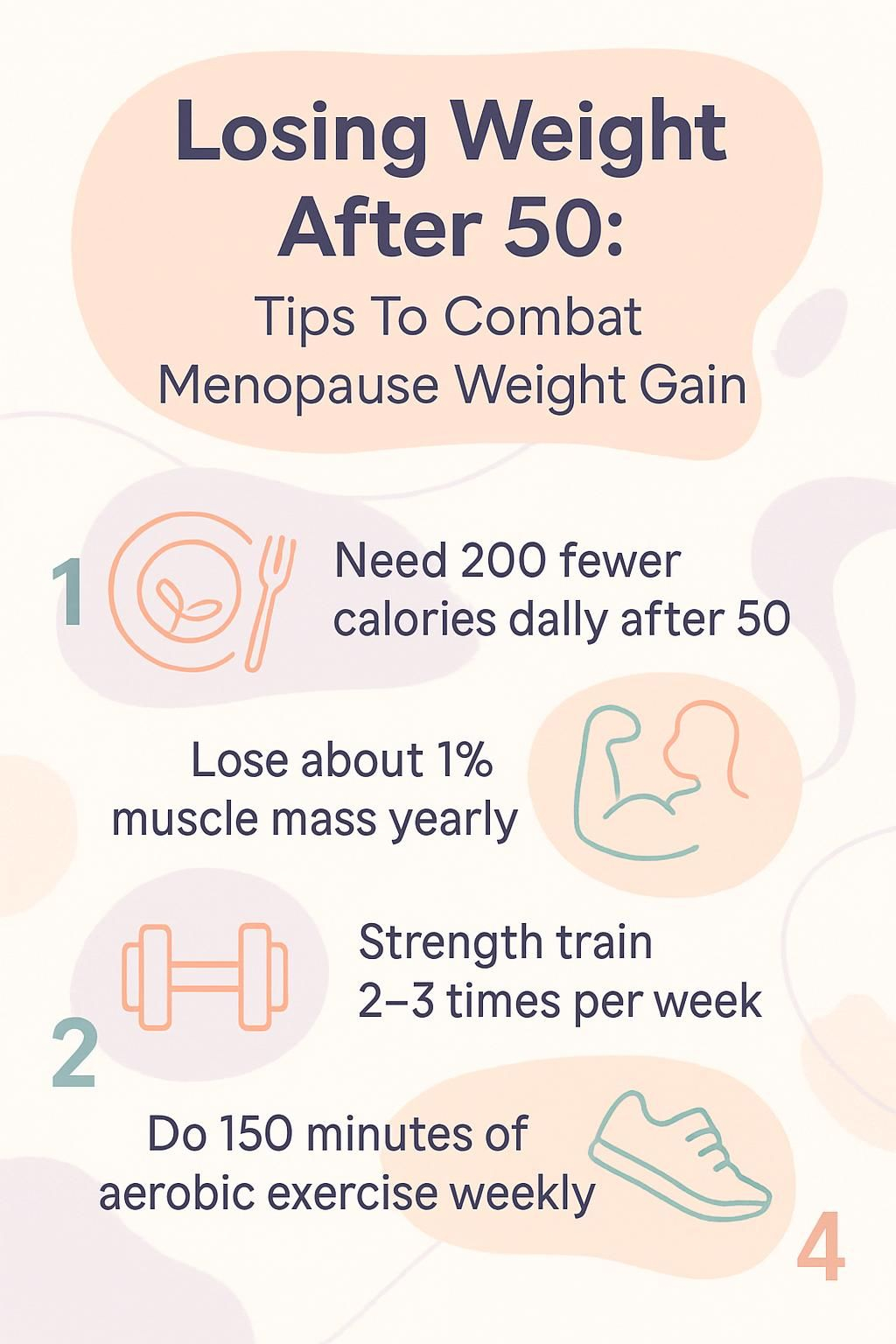Losing Weight After 50: Tips To Combat Menopause Weight Gain
Our Nutrition Assistant AI Suite will transform your body. You will lose fat, get toned, and build muscle. Gain confidence and optimal health.
If you are struggling with losing weight after 50, you are not alone. Menopause can cause hormonal changes that lead to extra pounds and increased belly fat. Many women over 50 find it harder to manage their weight because their metabolism slows and they lose muscle mass.
This post gives clear tips on healthy eating, exercise habits, and lifestyle changes that can help reduce your risk of heart disease, type 2 diabetes, and obesity. Learn simple ways to reach a healthy weight and boost your confidence.
Keep reading for practical steps to support your health during menopause.
Key Takeaways
- After age 50, women need about 200 fewer calories per day than before and lose around 1% of muscle mass yearly, making weight loss harder.
- Hormonal changes during menopause, including lower estrogen and shifts in ghrelin and leptin, increase belly fat and make losing weight more difficult (Mayo Clinic).
- Regular strength training (2–3 sessions per week) and at least 150 minutes of aerobic exercise weekly help preserve muscle and reduce menopause-related weight gain (CDC, 2021).
- Eating nutrient-dense foods such as leafy greens, whole grains, lean proteins, and limiting processed foods and added sugar supports weight loss and reduces chronic disease risk.
- Tracking food intake with apps like MyFitnessPal and monitoring physical activity with devices such as a Fitbit lead to greater long-term weight management success (Cadmus-Bertram et al., 2015).

Why Is It Harder to Lose Weight After 50?

Weight loss often becomes more challenging after age 50 due to changes in your body. You may notice that your usual diet and exercise routines are less effective for weight management during menopause.
How does a slower metabolism affect weight loss after 50?
After age 50, your resting metabolic rate drops because you lose muscle mass. This change means your body burns fewer calories each day, even while at rest. According to recent data, daily calorie needs fall by about 200 calories compared to younger adulthood.
If you stay moderately active, you may need about 1,800 calories per day after 50 instead of the 2,000 calories needed before. Past age 60, this drop increases to 400-500 calories fewer per day than at age 20.
Skipping these important adjustments makes it easier to gain weight and much harder to lose extra pounds.
Personal routines might need to shift to match these changes. I noticed that after my 50th birthday, sticking to my old diet led to steady weight gain even though my habits had not changed.
Paying attention to calorie intake and focusing more on strength training became essential for better weight control. This experience matches what experts say about the impact of metabolism on weight loss efforts for older adults.
As you get older, losing muscle mass lowers the number of calories your body burns, so eating the same way as before age 50 can cause weight gain.
Next, hormonal changes during menopause play a big role in weight gain and can further complicate weight management.
What hormonal changes during menopause impact weight gain?
During menopause, your estrogen levels drop. This causes fat to shift from your hips and thighs to your abdomen. Belly fat increases the risk of developing heart disease, stroke, and type 2 diabetes.
Hormonal changes also affect appetite-regulating hormones like ghrelin and leptin.
Ghrelin tells you when you are hungry; leptin signals when you are full. Their balance can change in middle age, making it more difficult to manage your weight or recognize hunger cues.
Mayo Clinic experts note that these shifts could make it harder for women ages 50 and above to lose excess weight even with a healthy diet. These hormonal changes play a key role in abdominal obesity during perimenopause and menopause.
Why does loss of muscle mass make losing weight more difficult?
Shifts in hormones during menopause can lead to more body fat and less lean muscle. Age-related muscle loss, called sarcopenia, becomes a major factor as you reach 50 and beyond. Each year after age 50, you may lose about 1 percent of your muscle mass.
By this age, adults often have lost around 10 percent compared to their younger years.
Skeletal muscle burns more calories than fat does. As your body loses muscle, your calorie needs drop because your resting metabolic rate slows down. If you keep eating the same amount without adjusting for this change, it gets much easier to gain weight and harder to lose it.
Less muscle means burning fewer calories both at rest and during physical activity or aerobic exercise. Many people find that traditional ways to lose weight do not work as well unless they focus on maintaining or building strength with activities like weight training.
How do lifestyle factors influence weight loss after 50?
Older adults spend 60-80% of their waking hours sitting or sedentary, which makes it more difficult to lose weight and keep it off. Arthritis, limited mobility, and balance issues may reduce stamina for exercise, but daily activities like walking or calisthenics help burn calories.
Sleep deprivation contributes to higher calorie consumption, increased hunger (physiology), and cravings for empty calories such as candy, soft drinks, or sweetened beverages.
Many people over 50 take medications like beta-blockers or insulin that can contribute to weight gain even with a healthy eating plan. Emotional health plays a role in successful weight management; the psychological impact from menopause weight gain can affect your motivation to follow a structured nutrition program.
Making small changes in physical fitness routines and focusing on fruits and vegetables during meals can help you lose weight after menopause.
Diet Tips for Losing Weight After 50
Smart diet choices play a key role in the way to lose weight after 50, so explore these weight management tips for effective results.
What whole, nutrient-dense foods should I focus on?
Eating nutrient-dense foods helps you maintain a healthy weight and supports your energy needs after 50. Research links certain foods to better waistlines, lower body fat, and many health benefits.
- Choose plenty of vegetables such as spinach, broccoli, carrots, peppers, and leafy greens; an extra daily serving can reduce waist circumference by about 0.14 inches in women according to a review of ten studies.
- Pick whole fruits like berries, apples, oranges, and pears; more fruits in your diet associate with lower body fat and reduced risk for high blood pressure and heart disease.
- Opt for whole grains such as oats, quinoa, brown rice, barley, or farro; these contain dietary fiber that supports blood sugar level control and helps you feel full longer.
- Include lean proteins from poultry, fish like salmon or mackerel (rich in omega-3s), eggs, tofu, or legumes; higher protein intake helps counter muscle loss linked with ageing.
- Add nuts (almond or walnut) and seeds (chia or flaxseed) to meals or snacks for heart-healthy fats and plant-based protein that can help maintain a healthy weight.
- Cook more meals at home using mostly whole-food ingredients; one study recommends starting with 1–2 home-cooked dinners each week for better diet quality.
- Enjoy legumes such as lentils or black beans with lunch or dinner; these are good sources of protein and fiber that support digestive health and stable blood sugar levels.
- Include low-fat dairy products like Greek yogurt or cottage cheese if tolerated; these provide calcium important for bone health while supporting muscle mass maintenance.
Focusing on these foods is a way to lose weight effectively if you are trying to lose weight during menopause or after age 50. Each choice plays a role in successful long-term health promotion and weight management tips.
Why should I reduce processed foods in my diet?
After focusing on whole, nutrient-dense foods like nuts, fruits, and vegetables, you should take steps to limit processed options. Convenience foods such as fast food and packaged snacks bring extra calories without offering the vitamins and minerals your body needs for healthy aging.
These items often contain unhealthy fats and added sugars. They usually replace healthier food choices in your daily meals.
A small study found that people eating ultra-processed foods consumed 500 more calories each day compared to those eating mainly whole foods. This higher calorie intake is linked to weight gain and a greater risk of chronic conditions such as heart disease and type 2 diabetes.
I noticed this myself after menopause, when even small portions of chips or doughnuts made it harder to maintain my body composition. Swapping these items for real meals filled with plant-based ingredients helped me manage my weight and feel energized throughout the day.
How can I create a calorie deficit effectively?
Cut about 200 fewer calories a day from your usual intake, as the department of health and human services reports daily calorie needs drop as you age. Use calorie-counting apps like MyFitnessPal or Cronometer to track what you eat and make sure you burn more calories than you consume.
Focus on eating a diet rich in whole, nutrient-dense foods, as these help you feel full on fewer calories and follow current dietary guidelines for best results.
Combine this approach with activities that you enjoy, such as walking or strength training, since exercise increases thermogenesis and burns calories. A 2017 *Obesity* study found people who paired dietary changes with exercise lost about 20 lbs over 18 months.
Swap juice or sugary drinks for water or coffee without added sugar to further reduce your calorie intake.
Should I eat smaller meals more frequently for weight loss?
Eating smaller meals more frequently does not guarantee weight loss after menopause. Evidence shows the best way to lose weight is by creating a calorie deficit, regardless of meal timing or frequency.
A 2014 study found that consuming fewer calories at night may help manage body weight and lower your risk for metabolic syndrome. People who ate larger breakfasts and lunches but a lighter dinner had better control over their human body weight.
Focusing on nutrient-dense foods and limiting added sugars or unhealthy fats plays a role in effective dieting. Prioritizing an early breakfast and moderate lunch can also stabilize blood sugar levels, reducing risks such as hyperglycemia associated with metabolic syndrome or cardiovascular disease.
Talk to your doctor if you have questions about changing your meal patterns as part of a personalized approach to health conditions related to menopause.
How can I limit added sugars and unhealthy fats?
After choosing meal frequency, it’s critical to focus on limiting added sugars and unhealthy fats for successful weight management after 50. Excess sugar can increase belly fat and raise insulin resistance, which makes it more difficult to control body fat percentage during menopause.
Read nutrition labels carefully. Watch out for ingredients like “cane sugar,” “high fructose corn syrup,” or “agave.” These sweeteners often hide in products such as flavored yogurt, breakfast cereal, condiments, and nut butters.
Cutting back on sweetened beverages is important because these drinks are strongly linked to obesity, heart disease, diabetes, and fatty liver in the United States. Swap soda and sugary juices for water or unsweetened tea to reduce both fluid calories and negative effects on your gastrointestinal tract.
Choose whole foods over processed snacks at least six days per week; this approach supports a plant-based diet that helps lower risk factors associated with menopause weight gain. You might allow yourself occasional treats to maintain motivation without derailing progress.
Use olive oil instead of butter when cooking; limit fried foods by baking or grilling instead.
Focusing on nutrient-dense options allows you to consume fewer empty calories while still getting fiber from whole grains and healthy fats from avocado or nuts (fruit). Small changes add up as you age—helping you avoid gaining those extra 1.5 pounds each year before menopause begins.
Exercise Strategies to Combat Menopause Weight Gain
Exercise supports muscle mass and strength, helping you burn more calories and manage adipose tissue; explore these strategies to discover which may best fit your weight management program after menopause.
Why is strength training important after 50?
After age 50, you begin to lose muscle mass and strength, a process called sarcopenia. This muscle loss can make it more difficult to manage your weight and can slow your metabolism.
Studies like the 2021 Sports Medicine review confirm that strength training benefits women over 50 by preserving muscle hypertrophy and supporting healthy adipose tissue balance. Unlike fat, muscle tissue burns more calories even when you are at rest.
You should aim for 2-3 strength training sessions each week to help counteract muscle loss. Combining this habit with higher protein intake helps preserve muscle mass. Strength training can also reduce your risk of developing chronic health conditions associated with weight gain, such as breast cancer and type 2 diabetes.
You may find that tracking your progress with a Fitbit or journal can boost motivation and help you see improvements over time.
How can aerobic exercises help with menopause weight gain?
Aerobic exercises such as brisk walking, cycling, or swimming help you burn calories and manage weight gain that often happens during menopause. The Centers for Disease Control and Prevention recommends adults get at least 150 minutes of moderate-intensity aerobic activity each week, which can help you burn about 300 calories a day, depending on your pace and body weight.
This calorie burn can help offset the slower metabolism and hormonal changes that make weight loss challenging as you get older.
Staying consistent with activities like jogging or dance classes can also reduce the frequency of hot flashes and support heart health, two common concerns during menopause. I noticed a difference myself when I walked daily and chose nuts and fruit as snacks instead of processed foods.
Aerobic exercise, combined with a balanced diet and strength training, makes it less likely for you to gain weight during the years before menopause and beyond.
What is high-intensity interval training (HIIT) and how does it help?
High-intensity interval training, or HIIT, means you alternate short bursts of intense exercise with brief recovery periods. These workouts usually last less than 30 minutes. You can do HIIT by walking fast or jogging for one minute and then slowing down to a steady pace for two minutes.
Recent studies show HIIT sessions give a bigger metabolism boost than moderate exercises like steady cycling or brisk walking.
Morning HIIT routines work especially well if your goal is weight loss after menopause. Researchers found that doing intervals in the morning improves metabolic health more quickly for mayo clinic patient groups likely to gain weight in their fifties and beyond.
This type of workout helps burn more calories both during and after your session, making it easier to lose extra pounds linked to hormonal changes such as polycystic ovary syndrome or signs and symptoms of menopause.
Focusing on exercises like these makes it possible to manage calorie intake, support muscle mass, and play a role in healthy aging after fifty.
How can I stay active throughout the day?
Staying active throughout the day boosts your metabolism and helps fight menopausal weight gain. Consistent movement supports calorie burning and can counteract effects of a sedentary job.
- Take a 5-minute walk every hour, as research shows this habit reduces health risks linked to long periods of sitting at work.
- Use a pedometer or Fitbit to track your steps daily. These tools help you set and reach activity goals, making movement part of your routine.
- Aim for 7,000–10,000 steps each day; start with realistic targets if you are new to these levels. Slow walkers (3.5 mph) who were overweight lost more fat in early weeks (Journal of Geriatric Physical Therapy, 2019).
- Choose stairs over elevators whenever possible. This adds extra aerobic exercise and helps maintain muscle mass after age fifty.
- Include household chores, gardening, or dancing as regular activities. These movements add up to burn calories without requiring gym visits.
- Schedule phone calls during walks or stand while working using a standing desk. Small changes like these support better posture and higher energy use.
- Replace late-hour TV watching with an activity such as stretching or yoga. This helps reduce the urge for late-night snacking, which impacts diet success.
Physical activity pairs well with structured exercise strategies discussed in the next section.
Lifestyle Changes to Support Weight Loss
Simple daily changes can play a role in steady weight loss after 50. Practical steps may help reduce menopause weight gain and support your long-term health journey.
How much sleep do I need for effective weight loss?
Experts recommend 7 to 9 hours of sleep each night for effective weight loss and better health. Research from 2016 shows people who sleep at least 7 hours per night have a 33% higher chance of losing weight compared to those who get less.
Poor sleep quality can increase your risk of obesity and slow your progress.
Getting enough rest supports your metabolism and helps regulate the hormones that play a role in hunger during menopause. From my experience, after prioritizing 8 hours of restful sleep, I found it easier to avoid late-night snacking and control cravings for foods high in sugar and unhealthy fats.
Consistent, quality sleep gives your body time to repair and helps you stay on track with your diet and exercise goals.
What are effective ways to manage stress?
Stress can make you crave high-calorie foods, which can slow your weight loss after menopause. Managing stress with healthy strategies supports your diet and helps control menopause weight gain.
- Practice yoga, deep breathing, or meditation daily to lower stress hormones that play a role in weight gain. I found even a short morning stretch made me feel calmer throughout the day.
- Aim for 7-8 hours of sleep each night to give your body time to recover and balance hormones linked to cravings and metabolism.
- Walk outside or do light aerobic activity like dancing or gardening; physical activity reduces tension and releases endorphins that help curb emotional eating.
- Limit drinking alcohol and caffeine because both can disrupt sleep and increase anxiety levels, making it harder to manage food choices at night.
- Choose nutrient-dense foods such as nut (fruit), leafy greens, berries, or fatty fish; eating these regularly has been shown in studies to reduce inflammation and support brain health when under stress.
- Schedule short breaks during your workday to stretch or take deep breaths; this keeps stress from increasing and helps you avoid snacking out of boredom.
- Consider speaking with a healthcare provider if you feel overwhelmed by stress or if antidepressant medications are affecting your mood or eating habits.
- Seek support from friends, family, or online groups, especially if you notice patterns of emotional eating linked to stressful events at home or work.
Why is staying hydrated important for weight loss?
Drinking at least 8 cups, or 64 ounces, of water each day helps your body burn fat and control hunger while losing weight after age 50. Hydration supports your metabolism and makes it easier to avoid mistaking thirst for hunger, which can lower the chance of overeating.
Choosing water-rich foods like fruits and vegetables boosts hydration further and supplies important nutrients that support weight management.
Flavored water or herbal tea offers a healthy switch from soda or other sugary drinks that add empty calories to your diet. During my own effort to lose weight after menopause, I carried a refillable bottle throughout the day.
This simple step helped me reach my daily goal without feeling deprived or tempted by less healthy options. Studies show people who stay hydrated often find it easier to manage their diet (1).
**Daily Water Intake Recommendations Table:**
| Age Group | Recommended Daily Water Intake |
|………–|…………………………-|
| Adults| At least 64 oz (8 cups)|
Staying hydrated may help you maintain better energy levels during exercise sessions as well.
How can avoiding late-night snacking help?
Late-night snacking raises your hunger levels and triggers more abdominal fat storage. Studies show that eating fewer calories at night can help manage your weight and lower the risk of metabolic syndrome.
After I started skipping snacks after dinner, I noticed less bloating and more energy in the mornings. Some research suggests that cutting out nighttime eating may prevent spikes in insulin and blood sugar, which can support weight loss after age 50.
Skipping late-night snacks also helps limit your daily calorie intake, making it easier to achieve a calorie deficit. Choosing to stop eating after dinner can keep your metabolism steady overnight.
If you focus on healthy habits like this, you can better control your diet and nutrition. Exploring protein’s role in weight loss after 50 will give you more tools for success.
The Role of Protein in Weight Loss After 50
Protein plays an important role in supporting weight loss after age 50, especially during menopause. Higher protein intake helps your body preserve muscle, maintain a healthy diet (nutrition), and manage your appetite.
How does increasing protein intake help maintain muscle?
Increasing your protein intake helps prevent muscle loss as you age. Higher protein diets have been shown to preserve muscle mass in women aged 70 to 79, with the greatest effects seen among Black women, according to a 2020 study from the American Journal of Clinical Nutrition.
Eating enough protein becomes important if you are losing weight after 50, since calorie restriction can sometimes lead to your body breaking down muscle for fuel.
Spreading your protein across three meals each day can improve your strength and metabolism. Adults over 67 who follow this pattern benefit more than those who eat most of their protein at only one meal.
Adequate protein also keeps your muscles strong while you reduce calories from your diet. Making lean and plant-based proteins part of your daily diet will support these goals. Next, you might want to learn which foods offer high-quality, lean, and plant-based proteins.
What are good sources of lean and plant-based proteins?
Good sources of lean and plant-based proteins help preserve your muscle mass after 50. You can find many options in both animal and plant foods to support healthy weight loss.
- Eggs make a convenient source of high-quality protein and work well at any meal.
- Skinless poultry, such as chicken or turkey breast, provides lean animal protein with less saturated fat than red meats.
- Fish like salmon, cod, and tilapia offer protein plus heart-healthy omega-3 fatty acids.
- Tofu contains complete plant-based protein, is low in fat, and supports vegetarian diets.
- Beans and legumes, such as black beans or lentils, add fiber and keep you full longer.
- Nuts and seeds supply plant-based protein along with healthy fats; choose unsalted varieties for better heart health.
- Lean meats like pork tenderloin or top sirloin beef are lower in unhealthy fats but still pack plenty of protein.
These choices can help you build meals to fuel your exercise plan, which is the next important strategy for managing weight during menopause.
The Importance of Tracking Progress
Tracking your progress helps you spot trends and celebrate small successes. Staying aware of your changes can keep you motivated as you continue your weight loss journey after 50.
How can a food journal or app improve weight loss?
Using a food journal or an app like MyFitnessPal or Cronometer helps you stay accountable. These calorie-counting apps allow you to track what you eat each day. MyFitnessPal is free and gives you a clear view of your calorie intake, making it easier to maintain a calorie deficit.
You can see which foods add extra calories or too much sugar and unhealthy fats.
Food journals let you spot areas for improvement in your diet. For example, after tracking your meals for a week, you might notice that alcohol (drug) adds more hidden calories than expected.
I once used MyFitnessPal to track my nutrition after age 50. Seeing my actual intake motivated me to make healthier choices and avoid late-night snacking. This self-monitoring supports weight loss by highlighting patterns and encouraging informed choices.
Why should I monitor my physical activity levels?
Tracking your physical activity helps you see patterns and progress. Devices like Fitbits, pedometers, and accelerometers let you count steps and measure the intensity of your exercise.
These tools can highlight when you need to add more movement or push yourself harder in your workouts. A study showed that people who used activity trackers walked nearly 2,500 extra steps per day compared to those who did not use them.[1] Setting daily step goals becomes easier with clear data.
Monitoring physical activity also keeps motivation high. You can celebrate small wins when you reach a new milestone or meet an exercise target for the week. I started using a Fitbit last year after menopause made weight loss tougher; seeing my daily numbers pushed me to walk during my lunch breaks instead of sitting at my desk.
Recording each walk helped me stay on track with my fitness goals, especially on days I felt tired.
…
[1] Cadmus-Bertram LA et al., “Randomized Trial of a Fitbit-Based Physical Activity Intervention for Women,” American Journal of Preventive Medicine, 2015
How often should I weigh myself?
Experts recommend regular weigh-ins to monitor menopause weight gain and support your weight loss journey after 50. Weigh yourself daily or weekly at the same time each day, such as in the morning before eating, for consistent results.
A two-year study found that people who weighed themselves frequently, tracked their data, and made adjustments saw greater success in losing weight and maintaining it; men benefited especially from this routine.
Consistent tracking helps you spot trends early, adjust your approach quickly, and celebrate small successes. Digital scales or logging apps can make monitoring easy and effective over time.
Next, explore how supplements like vitamin D or omega-3s might support your weight loss goals after menopause.
Supplements and Medical Guidance
Speak with your healthcare provider before starting any new supplements or making changes to medications. Medical guidance ensures that your weight loss plan supports your health and addresses menopause challenges.
Which supplements like vitamin D or omega-3s support weight loss?
Some supplements may help support weight loss after 50, especially during menopause. Nutrient absorption decreases with age, so you might need to pay closer attention to certain vitamins and minerals.
- Vitamin D helps control appetite and supports bone health. Blood levels of vitamin D often drop after menopause, making supplementation important for many women over 50.
- Omega-3 fatty acids from fish oil can reduce inflammation and may improve fat metabolism. Studies have shown that regular intake can also lower the risk of heart disease.
- B-complex vitamins, such as folate and vitamin B12, become harder to absorb with age. Insufficient B12 causes fatigue and mood changes that might hinder your weight loss goals.
- Green tea extract contains antioxidants and has been studied for its potential role in boosting metabolism. Discuss its use with your doctor before starting any new supplement.
- Magnesium plays a role in muscle function, energy production, and blood sugar control. Ensuring proper intake might make it easier to manage your weight and maintain energy for exercise.
- Calcium supplements are helpful if you do not get enough in your diet. Calcium supports strong bones but can also impact fat breakdown according to some studies.
- Probiotics support gut health, which affects digestion and how your body stores fat. Some research links healthy gut bacteria balance with lower body weight.
- Before taking any new supplement, consult your healthcare provider to avoid side effects or drug interactions. Personalized advice is essential for safe results at this stage of life.
I relied on my own experience using B-complex vitamins and noticed higher energy levels within a few weeks, which made exercising easier while managing menopause symptoms.
How can medications contribute to weight gain?
More than 20% of adults in the United States take medications that may lead to weight gain. These include beta-blockers for blood pressure, insulin and sulfonylureas for diabetes, antidepressants, steroids, and anti-seizure drugs.
Medications like these can directly affect your metabolism, often slowing it down, or they may cause your body to hold onto extra fluids. Some medicines increase your appetite, making you feel hungry more often.
After starting an antidepressant in my 50s, I noticed persistent weight gain despite no change in exercise or diet. I learned that many drugs cause this side effect by affecting hunger hormones or how your body stores fat.
If you experience unexplained weight gain and suspect your pills may play a role, ask your doctor for medical advice before changing or stopping any medication.
Strategies for Long-Term Weight Management
Long-term weight management after 50 often needs a steady routine with realistic goals. Many people use daily habits and support systems to maintain their progress over time.
How do I set realistic and achievable weight loss goals?
Setting realistic and achievable weight loss goals after age 50 supports your success. S.M.A.R.T. goals keep you focused while helping measure your progress over time.
- Choose Specific Goals: Define your target clearly, such as “lose 10 pounds” or “eat five servings of vegetables daily,” instead of vague ideas like “get healthy.”
- Make Goals Measurable: Attach numbers that track progress. For example, log 10,000 steps per day or visit the gym three days each week.
- Ensure Attainable Steps: Set goals that fit your current fitness level and health status. Starting small helps avoid frustration if results are slow.
- Stay Realistic: Consider age, medical conditions, and typical setbacks during menopause when planning targets. Most research suggests aiming for weight loss rates of one to two pounds per week for sustainable change.
- Add a Timeline: Give yourself a deadline or regular check-in dates, such as losing 10 pounds in twelve weeks or scheduling a health review every month.
- Track Your Progress: Mark start dates and record updates in a journal or app; this increases motivation and highlights improvements over time.
- Adjust Goals as Needed: Modify your plan if you hit plateaus or face unexpected challenges due to hormone changes or muscle mass loss with age.
Using S.M.A.R.T. strategies makes it much easier to stay on course and achieve lasting results after menopause.
What habits support sustainable weight management?
Developing healthy habits can make weight management after 50 more sustainable. Simple daily choices often lead to long-term results.
- Track what you eat using a food journal or app. This habit increases your awareness of calories and nutrients, which supports weight goals.
- Cook at home more often. Research links home-cooked meals with healthier diets and lower weight; start with preparing one to two meals each week if you are new to meal prep.
- Plan and prep weekly meals with foods like quinoa, brown rice, beans, lentils, grilled chicken, and roasted vegetables. Prepped meals reduce impulse eating and help control portions.
- Focus on body composition instead of just the number on the scale. Monitor both fat mass and fat-free mass for better long-term management.
- Eat slowly at each meal to help recognize hunger cues and prevent overeating.
- Limit processed foods and added sugars by reading nutrition labels before buying packaged items.
- Stay physically active every day by taking walks or standing up frequently during work hours, aiming for less sitting time.
- Set small, specific goals such as increasing your step count or reducing sugary snacks each week for ongoing motivation.
- Drink water regularly throughout the day since staying hydrated can decrease false hunger signals.
- Seek support from friends or family members who share similar health goals, which increases accountability and encourages lasting success.
These steps use evidence-based strategies that fit into daily routines for weight management after 50.
How can a support system or accountability partner help?
Having a support system or accountability partner can make a significant difference in your weight management journey after 50. Research from several weight loss studies found that people who join a weight management program with friends lose more weight and keep it off more successfully than those who go it alone.
For example, a 2005 study published in the journal Obesity showed that participants with social support were 66% more likely to maintain their weight loss for six months or longer.
Partnering with a friend, family member, or joining a group can make physical activity and healthy eating more enjoyable. Personal trainers also provide exercise guidance, motivation, and regular check-ins, so you stay on track with your goals.
In my experience, sharing weekly progress with a friend motivated me to stay consistent with my meal planning and workouts. This social connection helps you stick to your plan, making healthy habits easier to maintain for the long term.
The Benefits of Mindful Eating
Mindful eating helps you focus on your meals and supports weight loss after 50—read more to discover simple ways to apply this strategy.
How do I listen to my hunger cues effectively?
Paying attention to your hunger cues can improve weight control, especially after 50. This skill can help prevent overeating and support long-term healthy habits.
- Pause before each meal and check if you feel physical hunger or just the urge to eat from habit or stress.
- Use the “hara hachi bu” method from Okinawa: stop eating when about 80% full, rather than waiting until you feel stuffed.
- Eat slowly and chew food well; this gives your brain enough time, usually at least 20 minutes, to register fullness signals.
- Rate your hunger on a scale from 1 to 10 before eating and as you eat; aim to begin meals at moderate hunger, not when starving.
- Limit distractions like TV or phones during meals so you can focus on how satisfied you feel as you eat.
- Notice how different foods affect your satiety; for instance, protein-rich foods often keep you fuller longer than sugary snacks.
- Track patterns with a food journal or app to spot emotional triggers or times of day when non-hunger eating happens most often.
- Savor each bite by paying attention to texture, taste, and aroma; research shows mindful eating leads to better portion control and less mindless snacking.
Why should I eat slowly to avoid overeating?
Eating slowly gives your brain enough time to register fullness signals from your stomach. Research shows that it takes about 20 minutes for your brain to notice that you are full.
If you eat too quickly, you may consume more calories before these signals reach your brain. Savoring each bite helps you enjoy your meal and makes it easier to stop eating when satisfied.
Mindful eating also reduces the risk of consuming extra calories. A 2014 study found that people who ate slowly and practiced mindful eating consumed fewer calories than those who ate quickly.
In my own experience, slowing down at meals has helped me avoid feeling sluggish or uncomfortable after eating. Focusing on the taste and texture of your food supports healthy portion control and makes meals more enjoyable.
What are practical ways to practice portion control?
Slowing down at meals allows you to recognize fullness sooner, but controlling your portions can make an even bigger impact on weight loss. Simple strategies help prevent overeating and support steady progress after age 50.
- Use smaller plates or bowls to naturally reduce serving sizes. Visual cues can trick your brain into feeling satisfied with less food.
- Measure servings with cups, spoons, or a kitchen scale rather than estimating. Research shows most people misjudge portion sizes without measuring tools.
- Fill half your plate with non-starchy vegetables like broccoli, spinach, or peppers. These foods are low in calories but provide fiber that helps you feel full.
- Avoid eating directly from bags or containers as this encourages overeating. Place snacks and meals onto a plate before eating.
- Read nutrition labels to understand the correct serving size for packaged foods; some products contain multiple servings in one package.
- Eat slowly and pause between bites so your body has time to signal fullness before you finish eating.
- Commit to regular meal times and avoid distracted eating in front of screens to stay mindful about how much you eat.
- Follow structured programs such as Weight Watchers that teach portion control and track intake for extra accountability.
- Practice pre-portioning snacks into small containers or bags instead of keeping large packages within arm’s reach.
- Keep high-calorie treats out of sight or buy them in single-serving packages to limit temptation at home.
- Use mindful eating techniques focusing on taste, texture, and hunger cues rather than external triggers like stress or boredom.
Using these practical tips helps you manage calories effectively and create habits that make long-term weight management easier after 50.
Additional Tips to Boost Metabolism
Small changes to your daily routine can increase calorie burn and support healthy weight management after menopause. Explore new ways to boost your metabolism and keep your body active every day.
How do whole grains and fiber boost metabolism?
Whole grains like oats, quinoa, and brown rice make your body work harder during digestion. Your system uses more energy to break down these nutrient-dense foods than it does for processed grains.
One scientific study found that switching from refined grains to whole grains increased daily calorie burn by about 100 calories. This effect can help support a higher metabolism, which becomes especially important after age 50.
Fiber in whole grains also keeps you full longer and helps control appetite. Because fiber slows digestion, your body stays busy processing food for more hours, using extra energy in the process.
Many people find that eating fiber-rich foods gives them steady energy and better digestion throughout the day. Protein is another nutrient that works with fiber and whole grains for managing weight and muscle mass, leading into the next key topic: the role of protein in weight loss after 50.
Should I reconsider my alcohol consumption for weight loss?
Alcohol can slow your weight loss efforts after 50. Studies show that drinking even moderate amounts of alcohol, such as one or two drinks per day, can trigger hunger signals and increase the chance of overeating.
Each gram of alcohol contains seven calories, almost as much energy as a gram of fat. A single glass of wine or beer may add 120 to 150 calories without providing any nutrients.
Cutting back on alcohol might help you control cravings and reduce calorie intake each week. Health experts often recommend limiting alcoholic beverages if you are aiming for weight loss after menopause.
In my experience, skipping cocktails at social events helped me avoid late-night snacking and made it easier to stick to healthy meal plans. Reducing alcohol also supports better sleep quality, which can further support your health goals.
Why is sitting less and moving more important?
Sedentary behavior is linked to difficulty losing weight after 50. Older adults spend 60% to 80% of their waking hours inactive, which causes the body to burn fewer calories and slows metabolism.
Even short bursts of movement matter; taking a five-minute walk every hour or setting a step goal increases calorie expenditure throughout the day.
You do not need a gym membership or intense workouts to see a difference. Small increases in daily movement, such as choosing stairs over elevators or stretching during TV commercials, help break up long sitting periods.
In my own routine, I set a timer on my phone as a reminder to stand up and move every hour. This strategy helps keep my energy levels up and makes it easier to manage my weight. Simple daily changes can add up, supporting your efforts to combat menopausal weight gain and support better health.
Conclusion
Reaching and maintaining a healthy weight after 50 may seem challenging, but you can succeed with the right approach. Focus on eating nutrient-dense foods such as lean proteins, whole grains, fruits, and vegetables.
Include regular exercise in your routine; blend strength training and cardio for better results. Track your progress using journals or apps to spot trends and stay accountable. Aim for restful sleep each night and manage stress through healthy outlets like walking or meditation.
Consult healthcare professionals before starting new diets or fitness routines to make sure they fit your needs. Surround yourself with supportive friends, family members, or groups who encourage your goals.
These steps can help you overcome menopause weight gain while improving well-being.
FAQs
1. Why does menopause make it harder to lose weight after 50?
Hormonal changes during menopause slow metabolism and increase fat storage, especially around the abdomen. Research from the Mayo Clinic shows that lower estrogen levels can reduce muscle mass and raise body fat percentage, making weight loss more challenging.
2. What are the best foods to help combat menopause weight gain?
Eating lean proteins, whole grains, fruits, vegetables, and healthy fats supports metabolism and satiety. A study published in the Journal of Nutrition found that women who ate high-fiber diets lost more abdominal fat than those with low fiber intake.
3. How much exercise is recommended for women over 50 trying to lose weight?
Experts recommend at least 150 minutes per week of moderate aerobic activity, such as brisk walking or cycling, along with strength training twice a week. The Centers for Disease Control and Prevention reports that regular exercise helps maintain muscle, burn calories, and improve overall health.
4. Can lifestyle changes really make a difference in losing weight after menopause?
Yes, consistent healthy habits such as mindful eating, regular physical activity, stress management, and adequate sleep support long-term weight control. For example, one woman in her fifties shared that tracking her meals and walking daily helped her shed ten pounds over six months.
Summary: Menopause affects metabolism, but eating nutrient-rich foods, staying active, and adopting healthy routines help manage weight after 50. Scientific evidence supports these strategies as effective ways to combat menopause-related weight gain.







